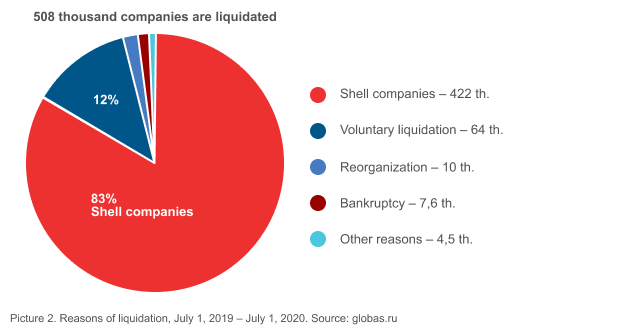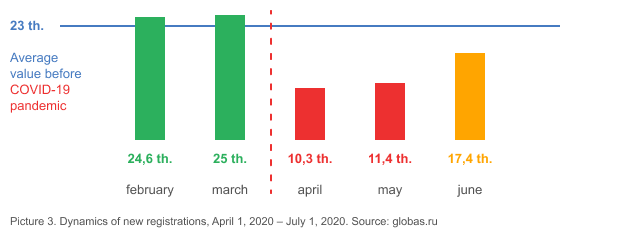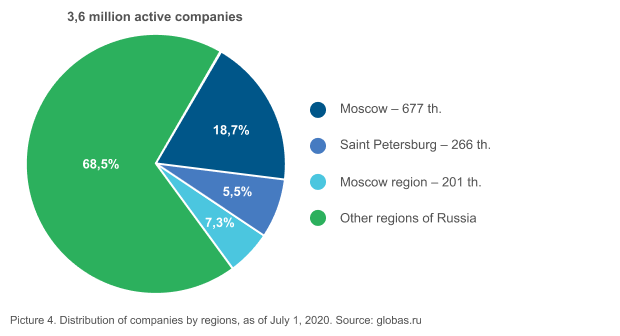The number of companies in Russia is decreasing
According to the Federal Tax Service as of July 1, 2020, the number of active legal entities in Russia was 3,6 million, that is by 234 thousand less than on July 1, 2019.
 Picture 1. Newly established and liquidated companies, July 1, 2019 – July 1, 2020. Source: globas.ru
Picture 1. Newly established and liquidated companies, July 1, 2019 – July 1, 2020. Source: globas.ruCompanies are registered less often than liquidated. The number of organizations ceased to operate exceeds the number of newly established companies by 2 times: from July 1, 2019 to July 1, 2020, about 250 thousand new legal entities were registered, while more than 500 thousand companies were liquidated.
This downward trend has been observing for several years.
Reasons for liquidation of companies
Over the past 12 months, 508 thousand companies have ceased their activities. Including 422 thousand (83%) were excluded from the Unified State Register of Legal Entities by the registration authority as inactive with signs of a shell company.
For economic reasons, companies are closed much less often: 64 thousand companies have ceased operations due to voluntary liquidation; 7,6 thousand - after bankruptcy; 10 thousand – after reorganization; 4,5 thousand companies had other reasons to be liquidated.
 Picture 2. Reasons of liquidation, July 1, 2019 – July 1, 2020. Source: globas.ru
Picture 2. Reasons of liquidation, July 1, 2019 – July 1, 2020. Source: globas.ruThe largest number of bankruptcies occurred in 2015: 11,2 thousand companies. On average, for this reason, about 10 thousand companies cease their activities per year.
It should be reminded that until October 6, 2020, a moratorium on bankruptcy is in effect for enterprises from affected sectors of the economy, strategic and systemically important companies.
Dynamics of registration of new companies
From July 1, 2019 to July 1, 2020, 251 thousand organizations are registered in Russia. In April 2020, an absolute historical minimum was recorded – 10,3 thousand, in May 2020 the indicator increased to 11,4 thousand, in June 2020 to 17,4 thousand newly registered companies. Before the COVID-19 pandemic, an average of 23 thousand companies were established monthly.
 Picture 3. Dynamics of new registrations, April 1, 2020 – July 1, 2020. Source: globas.ru
Picture 3. Dynamics of new registrations, April 1, 2020 – July 1, 2020. Source: globas.ruLLC / OOO is the main legal form in Russia
Of the total number of 3,6 million operating companies, 3 million are commercial, including: limited liability companies (LLC) – 2,9 million, joint stock companies (JSC) - 63 thousand. Non-profit organizations include 618 thousand legal entities.
Most companies in the capital regions
As of July 1, 2020, the largest number of operating companies were registered in Moscow - 677 thousand (18,7%), the Moscow region - 201 thousand (5,5%) and Saint Petersburg - 266 thousand (7,3%) Thus, 31,5% of all companies in Russia are concentrated in three regions.
 Picture 4. Distribution of companies by regions, as of July 1, 2020. Source: globas.ru
Picture 4. Distribution of companies by regions, as of July 1, 2020. Source: globas.ruChanges in legislation
The Federal law of July 13, 2020 No. 196-FL introduced a number of significant changes to the legislation governing the activities of consumer credit cooperatives, pawnshops and microfinance organizations.
Credit cooperatives
The law clearly defines the goals of creating credit cooperatives:
- organization of mutual financial assistance to members and associate members by combining share contributions, attracted funds in the form of loans, and other funds;
- placing funds through loans to members of cooperatives to meet their financial needs.
A mandatory requirement for the full name of credit cooperatives is the content of the word "credit".
Persons with criminal history on record for economic crimes or crimes against public authorities cannot be elected or appointed to the management boards, supervisory boards, to the positions of chairpersons or executive directors.
The Central Bank of the Russian Federation, when exercising control and supervisory functions over the activities of credit cooperatives, has the right to establish the forms, terms, procedure for drawing up and submitting reporting documentation.
Pawnshops
In addition, the Central Bank exercises supervisory functions over the activities of pawnshops and maintains the State Register of Pawnshops. Legal entities acquire the status of a pawnshop from the date of entering information about them in this state register and, accordingly, lose such status from the date of exclusion from it.
The absence within one year of concluded loan agreements secured by movable things or agreements for their storage are one of the main grounds for excluding a pawnshop from the state register.
The law also provides that the amount of loans provided by a pawnshop may not exceed the amount of assessment of the pledged items.
Microfinance organizations
The law establishes that such organizations are required to have an official website on the Internet with a domain name included in the group of domain names that make up the Russian national domain zone. Information in the field of personal data is subject to mandatory publication on such sites and in customer service points. The list of such information, the procedure and timing of their disclosure are also set by the Central Bank.
The federal law will come into force on October 10, 2020.
The subscribers of the Information and Analytical system Globas are able to get acquainted with the activities of all credit cooperatives, pawnshops and microfinance organizations. Globas totally contains data on over 8 thousand active organizations of this sector.